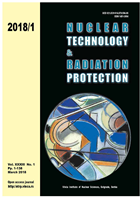
A MONTE CARLO APPROACH TO CALCULATE THE PRODUCTION PREREQUISITES OF 124I RADIOISOTOPE TOWARDS THE ACTIVITY ESTIMATION
Pages: 68-74
Authors: Hamid Azizakram, Mahdi Sadeghi, Parviz Ashtari, and Farhad ZolfagharpourAbstract
The Monte Carlo simulation code MCNPX has been used to simulate the production of 124I by 124,125Te(p, xn) and 123,124Te(d, xn) reactions to form high activity 124I. For this reason, the TALYS-1.8 and ALICE/ASH codes were used to calculate the reaction cross-section. The optimal energy range of projectile is selected for this production by identifying the maximum cross-section and the minimum impurity due to other emission channels. Target geometry is designed by SRIM code based on stopping power calculations with identical dimensions as the experimental data. The thick target yield of reactions is predicted because of the excitation functions and stopping power. All of the prerequisites obtained from the above interfaces are adjusted in MCNPX code and the production process is simulated according to benchmark experiments. Thereafter, the energy distribution of proton in targets, the amount of residual nuclei during irradiation, were calculated. The results are in good agreement with the reported data, thus confirming the usefulness and accuracy of MCNPX as a tool for the optimization of other radionuclides production. Based on the results, the 124Te(p, n)124I process seems to be the most likely candidate to produce the 124I in low-energy cyclotrons.
Key words: 124I, production yield, cyclotron, MCNPX, TALYS-1.8, ALICE/ASH
FULL PAPER IN PDF FORMAT (668 KB)
